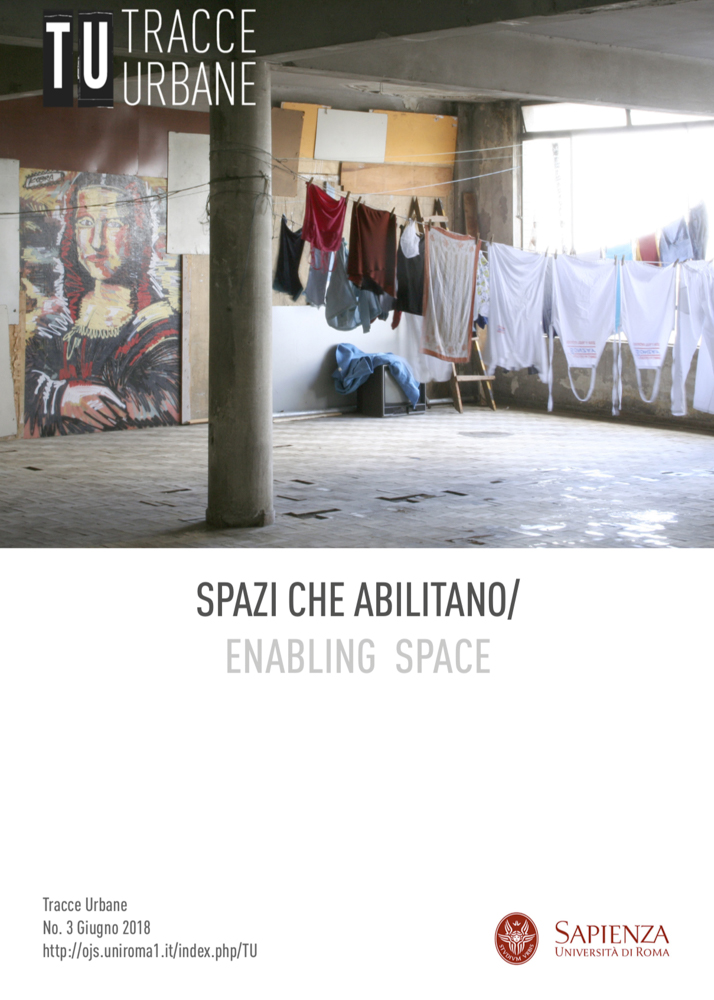"Enabling" Space. Dialogues and bridges between institutions and self-organized practices for a collaborative territorial planning.
DOI:
https://doi.org/10.13133/2532-6562_2.3.14304Keywords:
Periferie, Spazi Pubblici, riqualificazione, progettazione, studi urbani,Abstract
-References
Albrechts, L. (2003). Planning and power: towards an emancipatory planning approach. Environment and Planning C, 21(6), 905–924.
Bridge, G., & Watson, S. (2003). A companion to the city. Hoboken: Blackwell.
Bridge, G., & Watson, S. (2010). Retext(ur)ing the City. City: Analysis of Urban Trends, Culture, Theory, Policy, Action, 5(3), 350–362. https://doi.org/10.1080/13604810152706060
Brown, A., & Kristiansen, A. (2009). Urban Policies and the Right to the City: Rights, responsibilities and citizenship. UNESCO.
Esposito De Vita, G. (2018). How to Reclaim Mafia-Controlled Territory? An Emancipatory Experience in Southern Italy. In S. Knierbein & T. Viderman (Eds.), Public Space Unbound. Urban Emancipation and the Post-Political Condition (pp. 54–68). London & New York: Routledge. https://doi.org/10.4324/9781315449203-4
Hillier, J. (2002). Direct Action and Agonism in Democratic Planning Practice. In P. Allmendinger & M. Tewdwr-Jones (Eds.), Planning Futures. New Directions for Planning Theory (Vol. 1). London, New York: Routledge. https://doi.org/10.1017/CBO9781107415324.004
Knierbein, S., & Viderman, T. (2018). Public space unbound: urban emancipation and the post-political condition. London & New York: Routledge. Retrieved from https://books.google.it/books?hl=it&lr=&id=YGRRDwAAQBAJ&oi=fnd&pg=PT17&dq=Public+Space+Unbound,+knierbein&ots=lg-sQ-BLMu&sig=g_smr7BbgLUunjXhIY9Ad-g4Dms#v=onepage&q=Public Space Unbound%2C knierbein&f=false
Mouffe, C. (2013). Agonistics: Thinking the world politically. London, New York: Verso Books.
Novy, J., & Colomb, C. (2013). Struggling for the right to the (creative) city in Berlin and Hamburg: new urban social movements, new ‘spaces of hope’? International Journal of Urban and Regional Research, 37(5), 1816–1838.
Ostrom, E., Burger, J., Field, C. B., Norgaard, R. B., & Policansky, D. (1999). Revisiting the commons: local lessons, global challenges. Science, 284(5412), 278–282.
Ragozino, S., & Varriale, A. (2018). ‘The City Decides!’ Political Standstill and Social Movements in Post-Industrial Naples. In Public Space Unbound. Urban Emancipation and the Post-Political Condition (pp. 209–224). London & New York: Routledge. https://doi.org/10.4324/9781315449203-14
Simmel, G. (1908). The stranger. Social Theory: The Multicultural and Classic Readings, 4.
Tayebi, A. (2013). Planning activism: using social media to claim marginalized citizens’ right to the city. Cities, 32, 88–93.
Watson, S. (2013). City Publics. The (dis)enchantments of urban encounters. London & New York: Routledge. https://doi.org/10.4324/9780203962954
Downloads
Published
How to Cite
Issue
Section
License
NOTA DI COPYRIGHT
Proposta di licenza Creative Commons
1. Proposta per riviste Open Access
Gli autori che pubblicano su questa rivista accettano le seguenti condizioni:
Gli autori mantengono i diritti sulla loro opera e cedono alla rivista il diritto di prima pubblicazione dell'opera, contemporaneamente licenziata sotto una Licenza Creative Commons - Attribuzione che permette ad altri di condividere l'opera indicando la paternità intellettuale e la prima pubblicazione su questa rivista.
Gli autori possono aderire ad altri accordi di licenza non esclusiva per la distribuzione della versione dell'opera pubblicata (es. depositarla in un archivio istituzionale o pubblicarla in una monografia), a patto di indicare che la prima pubblicazione è avvenuta su questa rivista.
Gli autori possono diffondere la loro opera online (es. in repository istituzionali o nel loro sito web) prima e durante il processo di submission, poiché può portare a scambi produttivi e aumentare le citazioni dell'opera pubblicata (Vedi The Effect of Open Access).


